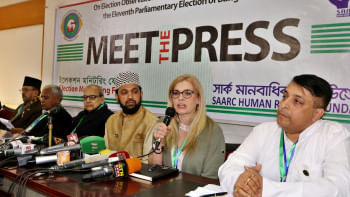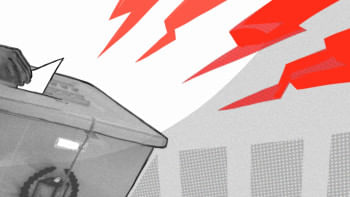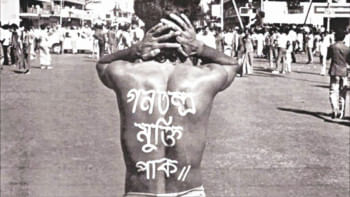Why is the EU pulling out of observing our election?

After exactly 4 years and 11 months, we saw with huge disappointment that the European Union has decided not to deploy a full-fledged election monitoring mission in Bangladesh for the coming parliamentary elections. It was on October 18, 2018 that the then EU delegation chief in Dhaka communicated their decision to the then chief election commissioner KM Nurul Huda that they would not be sending an election observation mission. At that time, the EU didn't give any reason for its decision. It, however, said that they would send two experts with a mandate to work on the electoral process and submit their recommendations to the European Commission. Since then we have not heard anything about their visit, recommendations, and the purpose of such exercise.
This time, the EU has explained its reasons for refraining from election monitoring to the Election Commission. But there has been no public announcement. According to EC Secretary Jahangir Alam, the EU decision has nothing to do with the EC's lack of preparation or that of a conducive environment, but the EU's budgetary constraints. A copy of the letter written by the current EU ambassador in Dhaka, Charles Whiteley, and seen by journalists, indeed stated the issue of the EU's election monitoring budget. But it comes along with "the fact that, at the present time, it is not sufficiently clear whether the necessary conditions will be met at the point in time when the elections take place."
It is almost unthinkable that the European Union, a composition of 28 nations akin to being a superstate, would be abandoning a crucial election observation mission for lack of funding. It is even more incredulous that the EU has just cancelled a $5 million grant to Zimbabwe's election commission over concerns about their independence and transparency in election management. This incredulity led some journalists to the EU spokesperson for foreign affairs and security policy, Nabila Massrali. Responding to a question about whether the budget crisis is the reason behind the EU's recent decision, she said that the decision was taken based on the opinion of the EU investigation team and independent experts.
In 2018, we saw a maximum number of parties taking part in the elections, but it was tainted by such unprecedented manipulation and disenfranchisement that the people dubbed it a "midnight election", as the ballot boxes were stuffed the night before the polls. The 2018 election was conducted almost without any international scrutiny as, like the EU, most other foreign observers were kept away using procedural barriers. The ruling party, however, managed to bring in quite a few friendly (and fake) observers, who had praised the election as a "global model."
According to Massrali, "the [exploratory] mission's mandate was to collect factual information and assess, from an independent and technical point of view, whether the deployment of an EU Election Observation Mission (EOM) to the upcoming parliamentary elections would be feasible, useful and advisable in line with the international standards that Bangladesh has signed up to." She also said that the mission, including four external experts, met with a wide range of election stakeholders including the foreign affairs ministry, election management bodies, the judiciary, representatives of political parties, the media and civil society, as well as those from security forces and the international community, and concluded that "an EU Election Observation Mission (EOM) would not serve for its purpose this time." Another notable point in the EU statement is that currently it is exploring other more suitable options to accompany the electoral process, should these be welcomed by the government and the Election Commission. This raises questions about a possibility that they might have felt unwelcomed by the government and the EC.
The EU European External Action Service (EEAS) spokesperson's words make it clear that the reason behind the EU decision is our failure to convince the world that we are trying everything possible to ensure that a free, fair, and democratic election takes place in Bangladesh. Some analysts may find it symptomatic of a coordinated move on the part of Western democracies, as the US announced the beginning of its visa restriction policy implementation from September 22, a day after the EU's decision to abandon election observation came out.
Whether these actions are coordinated or not, one thing is clear: the government's pledge about a free and fair election is no longer satisfying our international partners, as it has failed to take meaningful steps to create a conducive environment. In addition to the continuous refusal to initiate political dialogue, the ruling Awami League's continued confrontational strategy, harassment of political opponents, and abuse of government institutions for partisan gains are bound to frustrate everyone.
It is true that the EU ambassador warned us as early as last March that if the next election is not a participatory one, the EU would not send an observer mission. In 2018, we saw a maximum number of parties taking part in the elections, but it was tainted by such unprecedented manipulation and disenfranchisement that the people dubbed it a "midnight election", as the ballot boxes were stuffed the night before the polls. The 2018 election was conducted almost without any international scrutiny as, like the EU, most other foreign observers were kept away using procedural barriers. The ruling party, however, managed to bring in quite a few friendly (and fake) observers, who had praised the election as a "global model."
In a surprise move, the EU on January 2, 2019 issued a statement saying that despite various complaints about the 11th national parliamentary election, it would stand by Bangladesh in the interests of the people. Now, the initial reactions from our ministers – brushing aside the likely impact of recent EU-US actions – suggest that they may be hoping for a repeat of this approach.
This time, however, it's unlikely that the same history will repeat itself, as the European parliament recently passed a very strong resolution on Bangladesh's state of democracy, human rights, and the upcoming election. Moreover, the latest statement on the US' visa policy stated, without any ambiguity, "Our actions today reflect the continued commitment of the United States to supporting Bangladesh's goal of peacefully holding free and fair national elections, and to support those seeking to advance democracy globally."
For now, one can only hope that next month the US exploratory mission for election observation will commit a full-fledged deployment of poll monitors, and that this will encourage the EU to reverse its decision. International recognition is undeniably crucial to verify the legitimacy of any national election, and this cannot happen without closer observation by certain international bodies.
Kamal Ahmed is an independent journalist. His X handle is @ahmedka1

 For all latest news, follow The Daily Star's Google News channel.
For all latest news, follow The Daily Star's Google News channel. 











Comments